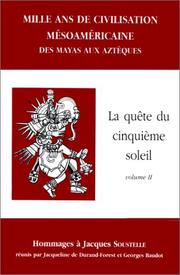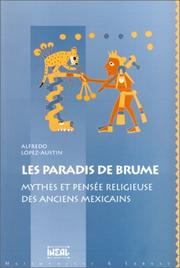| Listing 1 - 5 of 5 |
Sort by
|
Book
ISBN: 1457184281 1607322234 9781607322238 9781457184284 9781457184260 1457184265 9781607322221 1607322226 Year: 2014 Publisher: Boulder, Colorado : University Press of Colorado,
Abstract | Keywords | Export | Availability | Bookmark
 Loading...
Loading...Choose an application
- Reference Manager
- EndNote
- RefWorks (Direct export to RefWorks)
In Aztec Philosophy, James Maffie shows the Aztecs advanced a highly sophisticated and internally coherent systematic philosophy worthy of consideration alongside other philosophies from around the world. Bringing together the fields of comparative world philosophy and Mesoamerican studies, Maffie excavates the distinctly philosophical aspects of Aztec thought. Aztec Philosophy focuses on the ways Aztec metaphysics—the Aztecs’ understanding of the nature, structure and constitution of reality—underpinned Aztec thinking about wisdom, ethics, politics, and aesthetics, and served as a backdrop for Aztec religious practices as well as everyday activities such as weaving, farming, and warfare. Aztec metaphysicians conceived reality and cosmos as a grand, ongoing process of weaving—theirs was a world in motion. Drawing upon linguistic, ethnohistorical, archaeological, historical, and contemporary ethnographic evidence, Maffie argues that Aztec metaphysics maintained a processive, transformational, and non-hierarchical view of reality, time, and existence along with a pantheistic theology. Aztec Philosophy will be of great interest to Mesoamericanists, philosophers, religionists, folklorists, and Latin Americanists as well as students of indigenous philosophy, religion, and art of the Americas.
Book
ISBN: 0585004544 Year: 1997 Publisher: [Niwot, Colo.] : University Press of Colorado,
Abstract | Keywords | Export | Availability | Bookmark
 Loading...
Loading...Choose an application
- Reference Manager
- EndNote
- RefWorks (Direct export to RefWorks)
Aztecs --- Aztec mythology. --- Aztec philosophy. --- Geographical myths --- Mexico --- Regions & Countries - Americas --- History & Archaeology --- Religion.

ISBN: 273843066X 273843200X Year: 1995 Publisher: Paris : L'Harmattan,
Abstract | Keywords | Export | Availability | Bookmark
 Loading...
Loading...Choose an application
- Reference Manager
- EndNote
- RefWorks (Direct export to RefWorks)
Aztec philosophy --- Aztecs --- Maya philosophy --- Mayas --- Philosophie aztèque --- Aztèques --- Philosophie maya --- Antiquities --- History --- Antiquités --- Histoire --- Soustelle, Jacques,

ISBN: 2706812958 9782706812958 Year: 1997 Publisher: Paris: Maisonneuve et Larose,
Abstract | Keywords | Export | Availability | Bookmark
 Loading...
Loading...Choose an application
- Reference Manager
- EndNote
- RefWorks (Direct export to RefWorks)
Aztecs --- Aztec mythology. --- Aztec philosophy. --- Geographical myths --- Aztèques --- Mythologie aztèque --- Philosophie aztèque --- Mythes géographiques --- Religion. --- Religion --- Aztèques --- Mythologie aztèque --- Philosophie aztèque --- Mythes géographiques --- Aztecs - Religion. --- Geographical myths - Mexico.
Book
ISBN: 9789004252356 9789004252363 9004252363 130621033X 9781306210331 9004252355 Year: 2014 Volume: 4 Publisher: Leiden : Brill,
Abstract | Keywords | Export | Availability | Bookmark
 Loading...
Loading...Choose an application
- Reference Manager
- EndNote
- RefWorks (Direct export to RefWorks)
Calendars of Mesoamerican civilisations are subjected to what is categorised as “ritual practices of time”. This book is a comparative explication of rituals of time of four calendars: the Long Count calendar, the 260-day calendar, the 365-day calendar and the 52-years calendar. Building upon a comparative analytical model, the book contributes new theoretical insights about ritual practices and temporal philosophies. This comprehensive investigation analyses how ritual practices are represented and conceptualised in intellectual systems and societies. The temporal ritual practices are systematically analysed in relation to calendar organisation and structure, arithmetic, cosmogony and chronometry, spatial-temporality (cosmology), natural world, eschatology, sociology, politics, and ontology. It is argued that the 260-day calendar has a particular symbolic importance in Mesoamerican temporal philosophies and practices.
Maya calendar. --- Mayas --- Maya philosophy. --- Aztec calendar. --- Aztecs --- Aztec philosophy. --- Calendrier maya --- Philosophie maya --- Calendrier aztèque --- Aztèques --- Philosophie aztèque --- Rites and ceremonies. --- Rites et cérémonies --- Calendrier aztèque --- Aztèques --- Philosophie aztèque --- Rites et cérémonies --- Philosophy, Aztec --- Philosophy, Mexican --- Aztec Indians --- Azteca Indians --- Aztecan Indians --- Mexica Indians --- Tenocha Indians --- Indians of Mexico --- Nahuas --- Calendar, Aztec --- Calendar --- Philosophy, Maya --- Philosophy, Central American --- Calendar, Maya --- Philosophy
| Listing 1 - 5 of 5 |
Sort by
|

 Search
Search Feedback
Feedback About UniCat
About UniCat  Help
Help News
News